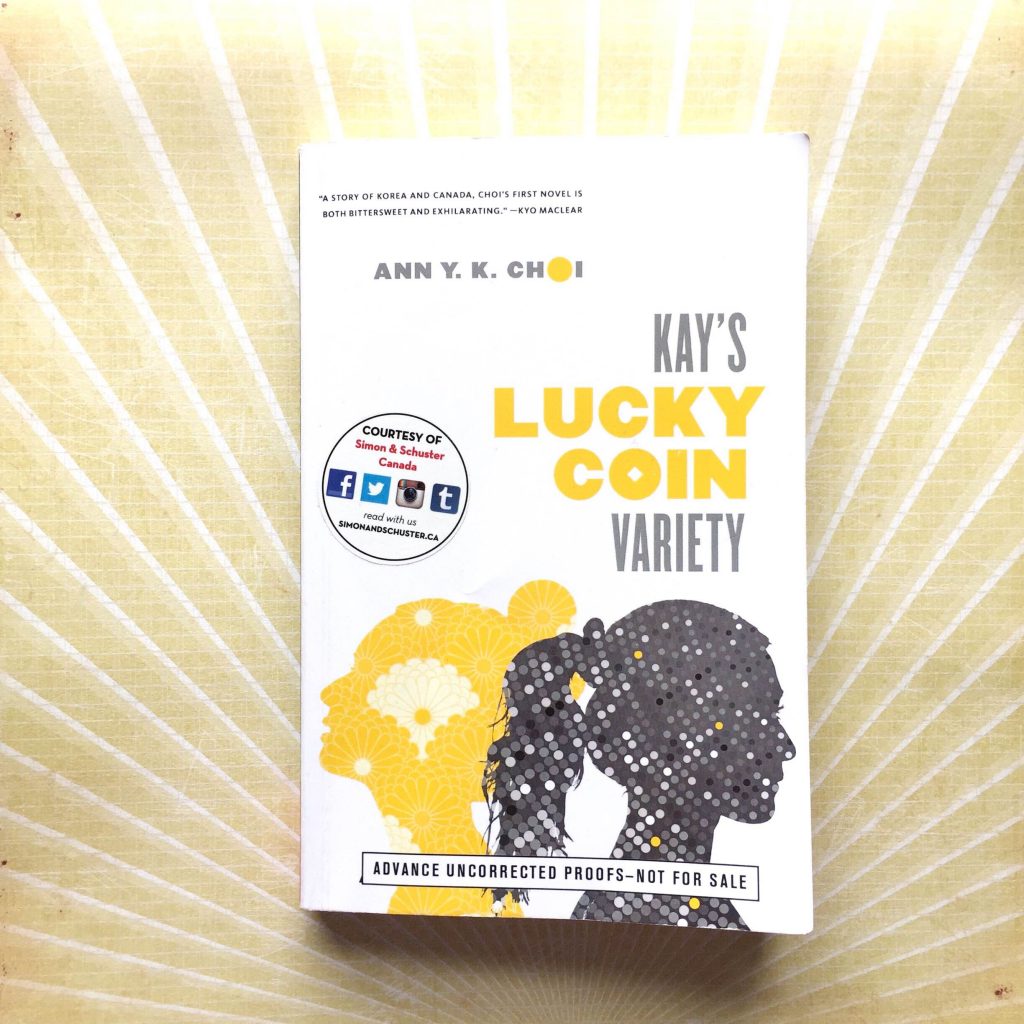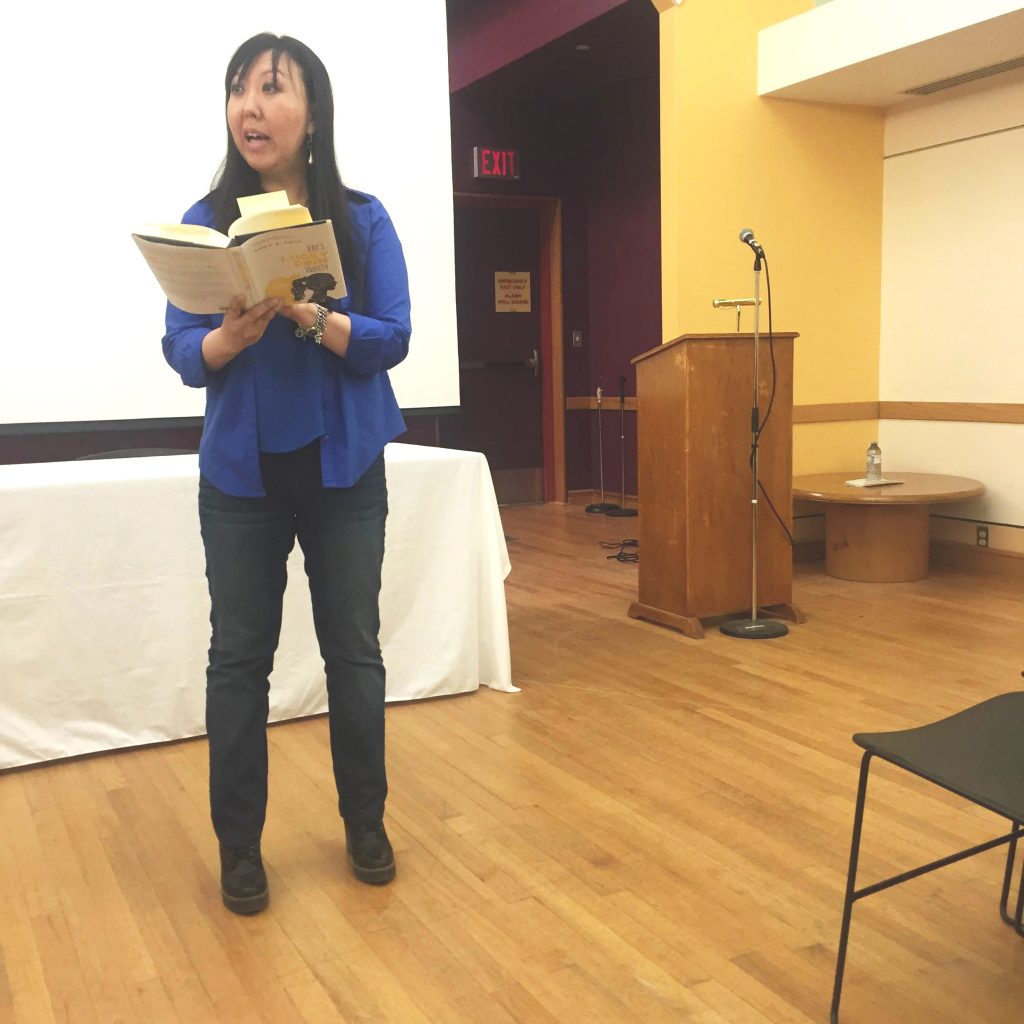Kay’s Lucky Coin Variety by Ann Y K Choi, via Simon & Schuster Canada, out now.
[I received this book from Simon & Schuster Canada in exchange for an honest review; this did not affect my opinion of the book whatsoever.]
Mother-daughter relationship and cultural background issues intertwine in Ann Y K Choi’s first novel, Kay’s Lucky Coin Variety, which was heavily based on her life. The main character, Mary (her Korean name is Yu-Rhee), struggles with growing up as an immigrant in Toronto in the ’80s: she is disconnected from white people and how they live their lives, she is bogged down by her parents’ strict Korean traditions and just as a girl turning into a woman by stressful circumstances.
Mary helps out in her parents’ variety store below their apartment on Queen Street West, where if a store is broken into, the owners let the thief take anything rather than putting up a fight and being seen as weak. The story follows Mary’s rough goings from Grade 11 until university graduation – through aggressive customers, a crush on her English teacher and unwanted advances from a family friend. Mary is often alone, in the store, in her friend group and in her family. She is different than the rest. She wants to eschew her Korean background for the normalcy white skin provides, but when provoked, she protectively fights for her culture. She keeps those feelings locked up, but tender. Mary’s narrative feels detached, monotonous, but it is rare that she feels a moment of happiness or peace. She is often angry or annoyed.
“Why don’t you have any Korean friends?” My mother would always begin the same way on the days my friends were coming to visit. Then her voice would turn accusatory, hostile. “You don’t like Korean people. You’re ashamed of our culture. But you’ll marry a Korean man if you know what’s good for you.”
Although I was always silent, I hated when she talked this way because part of me knew she was right. I wished I was bold enough to say to her: You can’t force me to be proud of my culture when you’ve given me nothing to be proud of. Life, I imagined, would be easier if we were white, ate white food, and took vacations at places like Myrtle Beach or Cape Cod. I also secretly desired a white last name, a name I didn’t need to spell out for people. It was remarkable how many people misspelled Hwang. It annoyed me that many people believed I was Chinese.”
Joon-Ho (or Sean), who Mary met on a trip to Korea for her grandmother’s funeral via her aunt’s neighbour, ends up coming to Toronto for university. He’s the closest thing to her culture that isn’t her family, and he has ways of enticing her with that connection. From the beginning you can tell he is a character you can’t trust though, and he becomes increasingly irritating. Romantically, Mary is obsessed with her high school English teacher Will, and pursues him once she graduates. Problems ensue from there, and they’re hard to ‘witness’ as a reader. You’re wishing you can urge Mary to shed these guys but she is stuck.
Mary’s relationship with her mother is the typical kind we all know, but fuelled with secrecy, forced traditions and misunderstandings. Mary is never hugged or told she is loved by her family, her family just doesn’t do that. Mary rejects what her mother wants, but doesn’t realize she’s practically following in her footsteps.
Ann is very vocal about how much this book has been influenced by her own life. She too grew up above her parents’ variety store on Queen Street West and sparred with her mother. I noticed how in the book, Mary’s mother always pesters ‘we work so you can have the happy life we didn’t get’ and now Ann is telling her daughter the same thing; she wants her daughter to know how she had to work for a better future. (Read more of what Ann has to say.) Recently at a reading of hers I went to she explained that it wasn’t just her story though, it was many other Korean immigrant women’s stories too. She felt that it was her duty to share because Western literature is severely lacking in diversity. Mary even acknowledges that in the book, that she wants to write so there can be something written by a Korean out there. Can you name many other books you’ve read by Asian authors? Ann’s motivation is real and a good piece of changing modern literature and I’m glad she was given such a platform for her story.
[When fighting with Will because he didn’t read anything by Asian authors she gave him]: Maybe it was my fault; I was expecting him to embrace that part of me that was foreign to him – to leave the comforts of his white world and try to see things from the point of view of an Asian protagonist, or at least go to a restaurant that didn’t require a steak knife.
I really liked this story (and am soooo curious of what her mom thinks of it because it got real tense at times). It was interesting, a window into a world I haven’t lived and soaked in life. I had difficulty at times with Ann’s writing style for Mary because her voice was passive and sometimes flat. Time would pass but we wouldn’t have known it unless she mentioned something in passing. For example, when Mary was speaking to Will about her writing: “Having just received yet another rejection letter from a poetry magazine to which I’d submitted several of my poems, I couldn’t help but shake my head at his compliment.” I found sentences like that happened a lot – it was more telling than showing. It felt like I had to connect the dots a bit. Nevertheless, that did not deter me from being invested in the story, and I am really interested in Ann’s next book that she is currently writing, based on a great-grandfather of hers who had taken two wives. At the reading last week she told the room she was having a lot of fun with destroying the character for the sake of her great-grandmother, so, I think it’ll be good! 😉
Ann Y K Choi’s story serves an important spot on Canadian literature’s bookshelf, and I hope people pick it up to read. (The library where her reading was said they had over 100 holds on it, so I think it’s doing quite well!)


